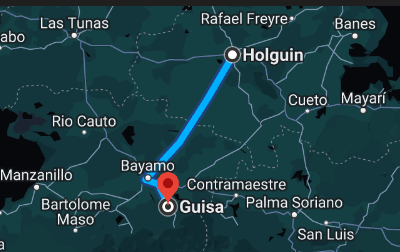
By Lien Estrada
HAVANA TIMES – This summer, I wanted to treat myself by visiting a place completely unknown to me: the Guisa Botanical Garden. This garden belongs to Bayamo and is very close to it, just a few minutes away by car. So, as soon as I arrived in Bayamo from Holguin, I took a small truck to my destination.
Transportation, which is private of course, isn’t too hard to find. It accommodated about 15 people, seven on each side and one in a separate small seat at the back. Along the way, it picks up a lot of people, because some get off and others get on, so the number can add up.
At one of the stops, almost reaching Guisa, the driver’s assistant, who opens and closes the door and is responsible for collecting fares, said to us: “If the police stop us at the next intersection and ask how much you were charged, you say 20 pesos, got it?” Everyone was stunned, sitting in their seats. We had been charged 200 pesos, a difference of 180 pesos, which for anyone is a huge difference. No one protested, despite their astonished faces. We know how to complain, but not how to demand our rights when they are violated. This unhealthy attitude has been ingrained for decades.
Only a few expressions came to life: “what abuse,” “this is outrageous,” “how much longer will this go on”… But that was as far as it went. I’m sure that if we had been stopped, which never happened, and a policeman had asked, we would have complied with all the anger that such an experience might entail.
The fact remains that transportation in this country never improved. And corruption hasn’t been overcome either. It is clear that public education and extensive political speeches about solidarity, honesty, and commitment to a socialist world —the best of all possible worlds— are not enough; they do not solve the human problem. Cuba shouts this truth from the rooftops every day. Because abuses continue without end.
But this practice of saying something that doesn’t match the reality being experienced is nothing new. I couldn’t help but remember a story a friend once told me. It was about a parade he didn’t attend, and the next day in class, he had to explain his absence. He was in middle school.
Before asking for explanations, the teacher said, “Please be honest. Above all, honesty. Whatever it is, I’ll be understanding, but you all need to be honest.” And he understood this. When it was his turn to explain why he hadn’t attended the patriotic march, he replied, “Honestly, teacher, I just didn’t feel like it.” He tells me the teacher jumped up and immediately said, “But boy, are you crazy! You can’t talk to me like that!” He didn’t know how to put it any other way. “You have to give me another reason! I can’t write that in the report!”
My friend shared with me that this was the first time he realized he had to learn to make up reasons, explanations, and thousands of excuses because the system didn’t always accept so-called honesty. Not to say that it never does, unless it coincides with its pre-designed agenda, which was planned long in advance.
And this experience of saying the opposite of what is true is not exclusive to educational institutions. It’s even more dramatic in workplaces. For example, when they talk about production that has never been done or will never be done, or cultural programs that supposedly took place but didn’t reality, the news can be very flattering, but in day-to-day life, the reality is diametrically opposed to what is expressed on the radio, in newspapers, on television, or in other media.
So society began to operate under the same codes. And people started to normalize responses that weren’t true, and therefore, deception, corruption, abuse, exploitation, and all the evils that plague us endlessly became part of life. Because in all this, the most affected is always the people. In this sick dynamic between maintaining power at all costs and the survival of the “smartest” and not-so-smart, the constant question is: What are we going to do?

However, I must not let these things sadden me more than I often am. I wasn’t going to let them sabotage my experience in Guisa. The interactions I had with the wonderful people of that place, like the director of the Casa de la Cultura who told me about Braulio Hill and the Lookout, the kindness of the people who gave me lodging, directions, those who shared their food with me, walking along paths, streets, stairways, elevations, places I had never seen in my life that were very pleasant to me.
And then the next day, when I arrived at the Botanical Garden I wanted to visit, I realized it was a great decision because I liked it a lot. Both the people and the place gave me beautiful moments, those that give you a boost, that help you keep living. And I have to thank life, my Providence, and everyone who made it possible, of course, for that joy. Once again, I confirmed that people who love and respect animals, plants, and children are special. For all this, and for the feeling of happiness, after all, I am grateful.

Read more from the diary of Lien Estrada here.




